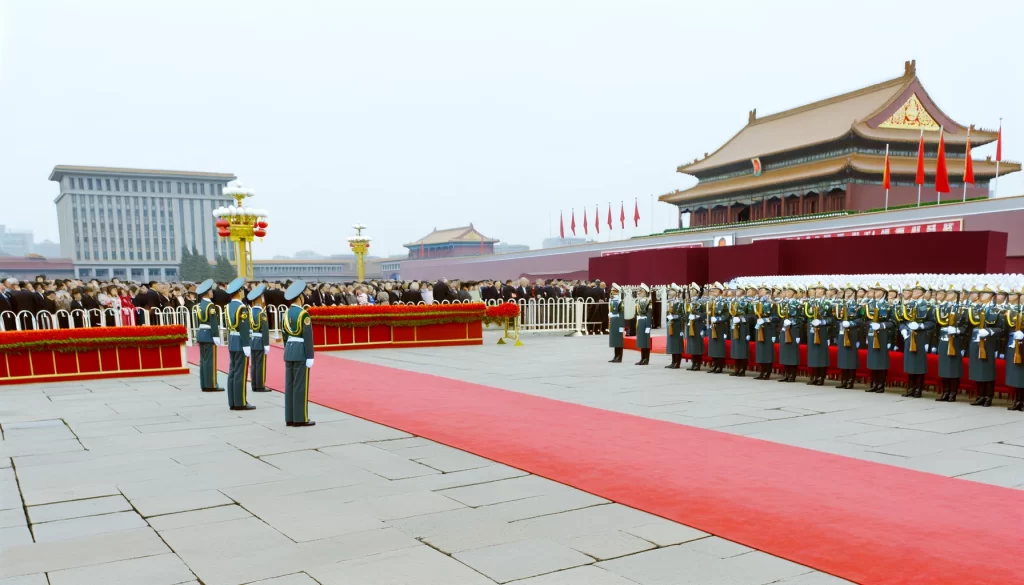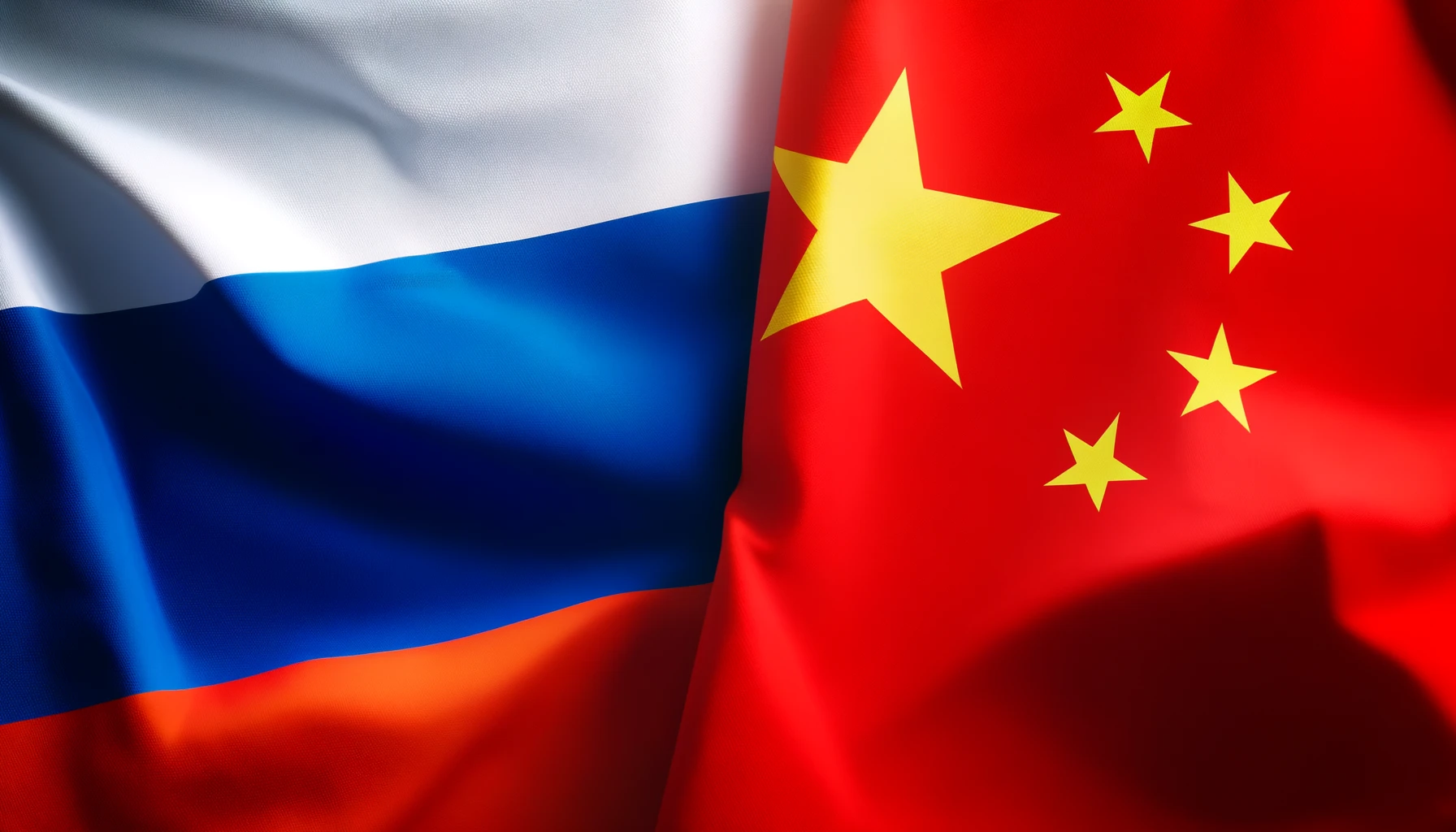Vladimir Putin’s visit to China this week highlighted significant changes in the relationship between Russia and China. Despite efforts to present a strong alliance, the visit revealed an imbalance in their partnership, with China now emerging as the dominant player.
A Grand Welcome
During the visit, Putin aimed to demonstrate that he still has powerful allies despite being ostracized by much of the international community due to his invasion of Ukraine. Chinese President Xi Jinping provided a warm reception, complete with a red carpet, a band playing old Red Army songs, and children cheering as the leaders walked through Tiananmen Square. The display of camaraderie even included a brief hug for the cameras, emphasizing the supposed closeness between the two nations.

Media Coverage vs. Reality
Russian and Chinese state media focused on the visible camaraderie between Putin and Xi. However, beneath the surface, the relationship is no longer one of equals. Putin came to China seeking support, as Russia faces heavy sanctions and increasing isolation. His speeches were filled with flattering remarks about China, including a rare mention of his family learning Mandarin, a gesture aimed at pleasing his hosts. He declared that he and Xi were “as close as brothers” and praised China’s economic progress, describing it as “developing in leaps and bounds.”
Xi Jinping’s Reserved Response
In stark contrast to Putin’s effusive praise, Xi Jinping’s remarks were much more subdued. He referred to Putin as a “good friend and a good neighbor,” avoiding the lofty language used by the Russian president. This disparity in their statements highlights the shift in power dynamics. The ongoing war in Ukraine has exposed the weaknesses in Russia’s military and economy, placing China in a more dominant position. Although China’s ties with the West are strained, Beijing has not isolated itself to the same extent as Russia and is cautious about jeopardizing its own economic interests.
Economic Priorities
The primary focus of Putin’s visit was economic support. Russia needs China’s help to mitigate the effects of international sanctions and sustain its war efforts in Ukraine. The makeup of Putin’s delegation, which included the governor of Russia’s Central Bank, the finance minister, and the economics advisor, underscored the economic priorities of the visit. The joint statement released during the visit included several initiatives to boost trade between the two countries. These initiatives included building a port on an island that had been a point of contention for over a century and negotiating with North Korea to allow Chinese ships to navigate through a key river to reach the East Sea (Sea of Japan).

U.S. Concerns
The United States closely monitored the visit, especially after U.S. Secretary of State Antony Blinken warned China against supporting Russia’s war effort. Blinken specifically cautioned against trading components that could be used in Russian drones and tanks. During his visit to the city of Harbin, Putin toured a state-backed university known for its cutting-edge defense research, a move that likely raised alarms in Washington. This tour, along with the symbolism of the visit, signaled that Xi is determined to show that he will not be swayed by Western pressure.
Strategic Calculations
Despite the show of unity, there are limits to how far Xi is willing to support Putin. China’s interests are not entirely aligned with Russia’s, and Xi will likely continue to cooperate only when it suits China’s strategic goals. The costly war in Ukraine has further isolated Russia, while China seeks to maintain stable relations with the West to support its own economic needs.
This article is based on the following article:
https://www.bbc.com/news/articles/c2lekp48n78o

Background Information on Russia-China Relations
Historical Context
Russia and China have a long and complex history that has evolved significantly over the centuries. Both countries have been major powers in their respective regions and have had periods of both cooperation and conflict. Understanding their historical interactions is crucial for grasping the current dynamics of their relationship.
- Early Relations and Conflicts: Russia and China share a border that stretches over 4,200 kilometers (2,600 miles). In the 17th century, both nations had territorial disputes. The Treaty of Nerchinsk in 1689 marked the first formal agreement between the Russian Empire and the Qing Dynasty of China, establishing borders and trade relations.
- 20th Century Shifts: The 20th century saw significant changes in both countries. After the Russian Revolution in 1917, the Soviet Union was established, and in 1949, the People’s Republic of China was founded following the Chinese Communist Revolution. Initially, the two communist nations were allies, but ideological differences led to the Sino-Soviet split in the 1960s, resulting in strained relations.
- Reconciliation and Cooperation: In the late 1980s and early 1990s, with the end of the Cold War and the dissolution of the Soviet Union, Russia and China began to rebuild their relationship. They signed several agreements to settle border disputes and increase economic cooperation. By the early 21st century, their partnership had strengthened, driven by mutual interests in countering Western influence and boosting trade.
Political Systems and Leadership
Understanding the political systems and leadership styles of Russia and China provides insight into how these countries operate and interact on the global stage.
- Russia: Russia is a federal semi-presidential republic. Vladimir Putin has been a dominant figure in Russian politics for over two decades, serving as both president and prime minister. His leadership is characterized by a centralization of power, a focus on national sovereignty, and a confrontational stance towards the West.
- China: China is a single-party state led by the Communist Party of China (CPC). Xi Jinping, the General Secretary of the CPC, has consolidated significant power since taking office in 2012. His leadership emphasizes strengthening the party’s control, expanding China’s global influence, and achieving economic modernization.
Economic Context
The economic relationship between Russia and China is a key aspect of their partnership, driven by complementary needs and strategic interests.
- Russia’s Economy: Russia’s economy is heavily reliant on natural resources, particularly oil and gas. Western sanctions imposed after the annexation of Crimea in 2014 and the invasion of Ukraine in 2022 have significantly impacted its economy. Russia has turned to China as a major trading partner to mitigate these effects.
- China’s Economy: China has the world’s second-largest economy, driven by manufacturing, exports, and a rapidly growing consumer market. However, it faces challenges such as an aging population, environmental issues, and economic imbalances. China seeks stable relations with key global markets, including the West, to sustain its economic growth.
Geopolitical Context
The geopolitical landscape shapes the interactions between Russia, China, and other global powers.
- The United States and Western Influence: The United States and its allies have significant influence on global politics and economics. Both Russia and China often position themselves in opposition to Western policies and seek to create a multipolar world where they have greater influence.
- Sanctions and Diplomacy: Western sanctions on Russia have driven it to seek closer ties with China. Diplomatically, both countries support each other in international forums and often present a united front against Western criticism.
Current Events
Several current events and trends are essential for understanding the nuances of the article.
- Ukraine Conflict: Russia’s invasion of Ukraine in 2022 has isolated it internationally and led to severe economic sanctions from the West. This conflict has strained Russia’s resources and highlighted its need for economic and political support from allies like China.
- China’s Global Ambitions: Under Xi Jinping, China has pursued ambitious initiatives like the Belt and Road Initiative (BRI), aimed at expanding its influence through infrastructure and investment projects worldwide. China seeks to balance its strategic partnership with Russia while maintaining stable economic relations with Western countries.
- International Reactions: The international community, particularly the United States and Europe, closely monitors the Russia-China relationship. Any significant developments, such as military cooperation or major trade deals, can have far-reaching implications for global geopolitics.

Debate/Essay Questions
- What are the potential risks and benefits for China in supporting Russia amidst the Ukraine conflict?
- In what ways does the war in Ukraine reshape the dynamics of the Russia-China relationship?
Please subscribe to Insight Fortnight, our biweekly newsletter!
